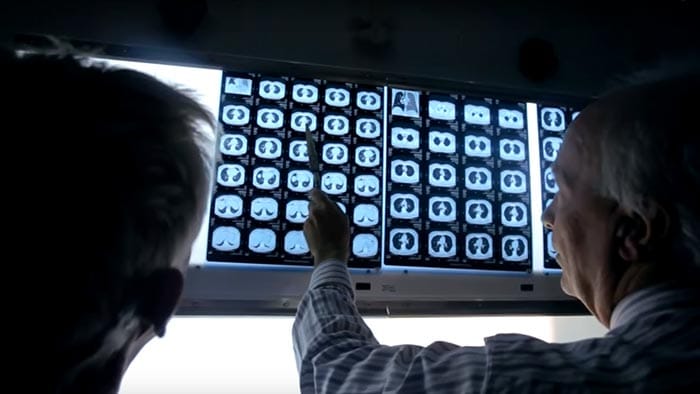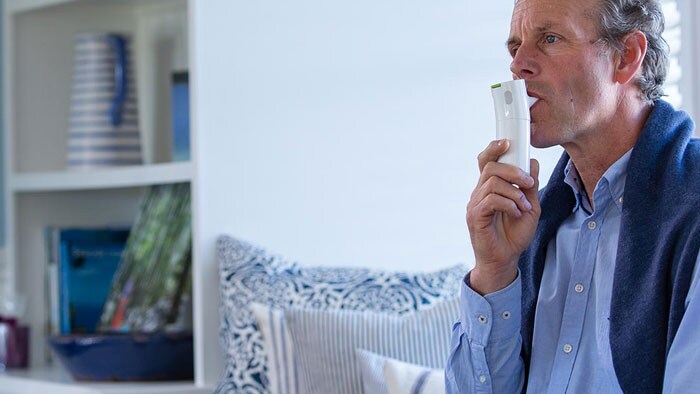COPD treatment options for each stage
Living with COPD can be a journey, with opportunities to manage and challenges to overcome at every stage. Different Therapies span the breadth of your COPD journey and are designed to fit seamlessly into your lifestyle, helping you live life as close to your terms as possible.
What is COPD?
COPD athlete Russell Winwood and his physician Dr. Wayne Kelly discuss the condition, causes and diagnosis
More information on COPD
Have a question? We’re here to help
Call us at 1800 830 517
Have a question? We’re here to help
Call us at 1800 830 517
What is COPD?
Chronic Obstructive Pulmonary Disease (COPD) causes difficulties with breathing and increased breathlessness. With chronic bronchitis, the tubes (bronchi) that take air in and out of the lungs become inflamed, causing excessive mucus production and coughing. The presence of inflammation and mucus causes the bronchi to narrow. This not only limits the normal amount of air from reaching the lungs but also prevents them from fully deflating, leaving lots of residual air in the lungs1. With emphysema, the presence of inflammation in the alveoli (air sacs) reduces their flexibility. In some cases, they collapse, making it difficult for air to enter and leave the lungs. As a result, they contain more air than normal, a state known as hyperinflation. The combination of hyperinflation and the extra effort needed to breathe results in the sensation of breathlessness1.
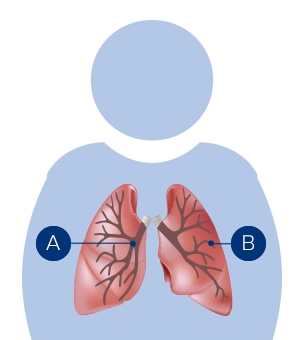
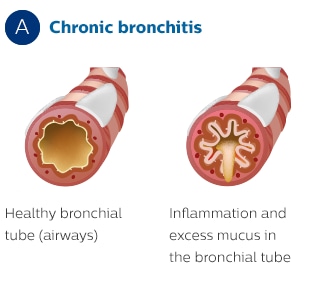
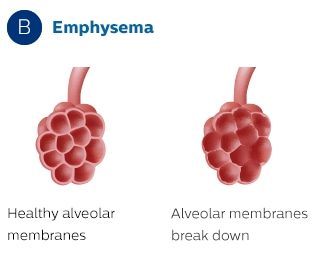
Stages of COPD
Mild to moderate COPD symptoms
Many people in the earliest stages of COPD don’t realize they may have a more serious condition. While they may find their breathing limited, many people don’t always seek medical attention until it worsens. Moderate COPD can result in more coughing and production of mucus, at which point your doctor may prescribe medication or pulmonary rehabilitation2.
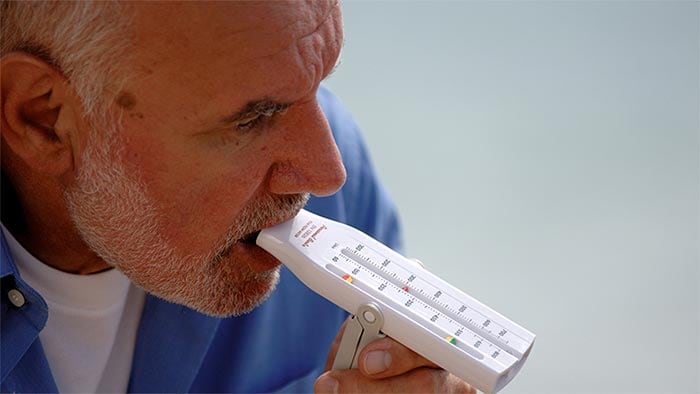
COPD solutions to support mild or moderate COPD
A peak flow meter is used to measure how fast you blow out air from your lungs. A peak flow meter is also used to determine if your asthma symptoms are putting you into the yellow or red zone of your asthma action plan.
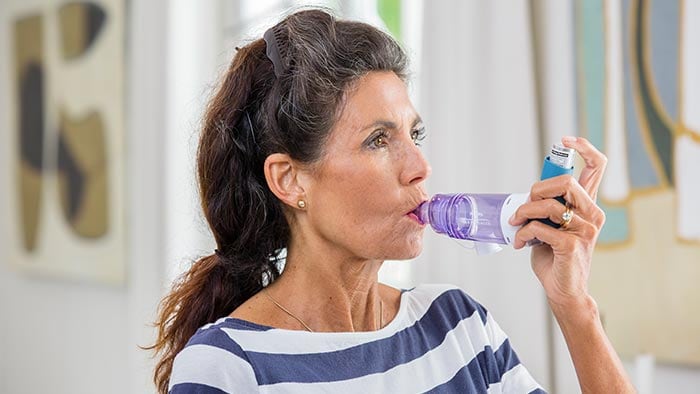
Your healthcare professional may prescribe reliever medication delivered by a pMDI inhaler or nebuliser for breathing treatment of worsening symptoms. Nebulisers turn liquid medication into a fine mist that is more easily absorbed into your lungs. The goal is to get your or your child back to the green zone and doing well. Medicine often ends up in your mouth, throat and stomach when using an inhaler on its own. A valved holding chamber (sometimes called a spacer) may improve drug delivery to the lungs where it is needed by as much as up to 4 times. Getting the right amount of medication can help reduce day-to-day symptoms and keep you in the green zone 3
Severe to very severe COPD
In later stages of COPD, breathing becomes more difficult, and with more fatigue can make your normal daily activities more challenging. Exercise may become increasingly difficult. If your breathing issues and flare-ups are impacting your health and quality of life significantly, your doctor may prescribe oxygen therapy to ensure your body is getting enough oxygen4.
Frequently asked questions
- What is COPD?
-
COPD is a term that covers a number of progressive lung conditions that make breathing difficult, including chronic bronchitis and emphysema¹. One of the main causes is prolonged exposure to cigarette smoke, especially if the smoke is inhaled. However, breathing in second hand smoke, air pollution, chemical fumes and dust from the environment or workplace can also cause COPD².
1. Web MD. What is chronic obstructive pulmonary disease (COPD)?
www.webmd.com/lung/copd/tc/chronic-obstructive-pulmonary-disease-copd-overview
on 4 August 20152. Web MD. 10 FAQs About Living With COPDWhat is chronic obstructive pulmonary disease (COPD)?
www.webmd.com/lung/copd/10-faqs-about-living-with-copd#2
on 5 August 2015 - What are the symptoms of COPD?
-
A chronic cough, one that lasts for several weeks without the presence of other illness such as cold or flu, is the first sign of COPD. The cough is usually worse early in the morning, and may be aggravated by exercise or smoke. Other typical symptoms include shortness of breath, wheezing, tightness in the chest and increased mucus (or phlegm) production 1,2.
1. Healthline. Six signs of COPD.
www.healthline.com/health-slideshow/copd-symptoms#9
on 24 June 2015.2. European Lung Foundation. Lung Factsheet: Living well with COPD.
www.european-lung-foundation.org
on 19 June 2015.
- What causes COPD?
-
One of the main causes of COPD is prolonged exposure to cigarette smoke, especially if the smoke is inhaled. But breathing in secondhand smoke, air pollution, chemical fumes or dust from the workplace also can cause the condition1.
These inhaled particles can cause the mucus glands that line the bronchi to produce more mucus than normal. In addition, the inflammation that they trigger causes the walls of the bronchi to thicken and swell. Environmental factors and genetics may also play a part in the development of COPD 1,2.1. Web MD. 10 FAQs About Living With COPDWhat is chronic obstructive pulmonary disease (COPD)?
www.webmd.com/lung/copd/10-faqs-about-living-with-copd#2
on 5 August 20152. medicinenet.com. Chronic Bronchitis
www.medicinenet.com/chronic_bronchitis/page3.htmlon 5 August 2015.
- How is COPD treated?
-
Although there is no cure for COPD, there are many effective treatments available to help you manage your symptoms and slow the progression of COPD, so that you can live an active life1.
1. Healthline. COPD and You: Managing Your Symptoms.
www.healthline.com/health/copd/and-you-symptom-management#1on 10 July 2015.
- How will my illness progress?
-
COPD has four stages, each one with different symptoms of increasing severity. However, by monitoring your symptoms and effectively managing them, it is possible to slow the progression of the disease and to enjoy a more active life1,2.
1. Healthline. COPD and You: Managing Your Symptoms.
www.healthline.com/health/copd/and-you-symptom-management#1on 10 July 2015.
2. Healthline. COPD: Symptoms and Stages.
www.healthline.com/health/copd/stages#Overview1
on 6 June 2015.
- What is pulmonary rehab?
-
Combining a program of exercise, education and support, pulmonary rehab can help you live more comfortably with COPD by increasing your capacity for exercise and improving your mobility. You’ll learn about effective breathing techniques, relaxation exercises, the use of medication and oxygen, good nutrition and travel tips, as well as how to avoid flare-ups and stay healthy. Pulmonary rehab also provides an opportunity meet others with COPD to exchange experiences, provide mutual encouragement and increase determination to improve fitness levels and fight the disease1.
1. American Association of Cardiovascular and Pulmonary Rehabilitation (AACVPR). Pulmonary Rehabilitation.
www.copdfoundation.org/Portals/0/Files/pdfs/AACVPR-FactSheet.pdf
on 6 June 2015. - Is COPD hereditary?
-
Genetics can play a part in the development of COPD, even if you have never smoked or been exposed to pollutants for an extended period of time. In particular, emphysema can be triggered by a deficiency in alpha-1 antitrypsin (AAT), which is a protein that protects the lungs from the harmful effects of white blood cells in the lungs. However, not everyone with COPD who has never smoked has a deficiency on AAT, so it is believed that there must be other genetic triggers for COPD1.
1. COPD Foundation:
www.copdfoundation.org/What-is-COPD/Understanding-COPD/What-is-COPD.aspx#sthash.PjPozNK3.dpufon 23 June 2015.
- Are there actions I can take to manage my COPD?
-
There are a number of things you can do that will greatly help you to manage your COPD1,2.
- Stop smoking
- Take regular exercise
- Eat well and maintain a healthy weight
- Practice breathing and relaxation techniques
- Learn how to cough effectively
- Recognize and avoid the factors that trigger flare-ups
- Have an action plan for flare-ups
- Take your medications as prescribed
- See your doctor regularly, even if you feel well, and especially if you have any concerns
- Find out if you qualify for pulmonary rehabilitation

Have a question? We’re here to help
References
1 medicinenet.com. Chronic Bronchitis http://www.medicinenet.com/chronic_bronchitis/page3.html 5 August 2015. 2 Mayo Clinic. Emphysema http://www.mayoclinic.org/diseases-conditions/emphysema/basics/definition/con-20014218 5 August 2015. 3www.asthma.org.uk/advice/inhalersmedicines.treatments/inhalers-and-spacers January 2016. 5 Lung Institute www.lunginstitute.com/blog/stages-of-copd-mild-through-end-stage 4 March 2018
ALWAYS FOLLOW THE DIRECTIONS FOR USE.
